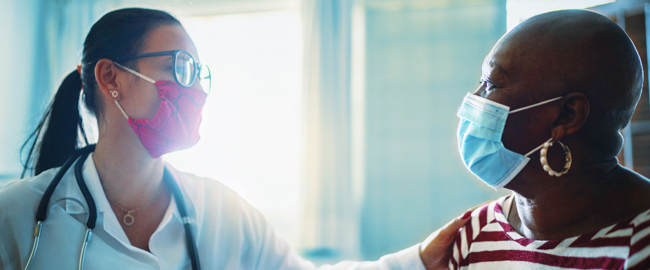Esophageal Cancer Diagnosis in New Jersey
If you have symptoms of esophageal cancer, your doctor may recommend testing. At Hackensack Meridian Health John Theurer Cancer Center, we always start with the least invasive approaches to diagnosing cancer. Our advanced imaging, endoscopy and genomics laboratory allow us to make a highly accurate diagnosis and recommend a treatment plan targeted to your exact cancer.
Many times, esophageal cancer does not cause symptoms until it is advanced, making it harder to treat. Contact your doctor if you have any of the following symptoms, which may be a sign of esophageal cancer or another health condition:
- Anemia, fatigue and weakness (caused by bleeding in the esophagus)
- Black tar-like stools (caused by bleeding in the esophagus passing through the digestive tract)
- Chronic cough
- Difficulty and/or painful swallowing
- Hoarse voice
- Indigestion, burning or pressure in the throat or chest
- Unexplained weight loss
- Vomiting
Your doctor will meet with you to discuss your symptoms, examine you for signs of esophageal cancer and take a medical history to consider risk factors.
Sometimes, people with esophageal cancer become anemic from a bleeding tumor. Your doctor may order blood tests to check your red blood cell count for anemia.
John Theurer Cancer Center offers the most advanced high-definition imaging technology. Our radiologists have training and experience diagnosing cancer of the upper gastrointestinal tract. Imaging is important in determining the size and depth of esophageal tumors for surgical planning. Advanced imaging tests may include:
- CT
- MRI
- PET
A barium swallow test is a noninvasive way for doctors to see if you have any abnormal areas of the esophagus.
- You swallow barium – a thick, chalky liquid – that coats the walls of the esophagus.
- We take x-rays of your upper gastrointestinal (GI) tract.
- The barium outlines the lining of your esophagus. This allows our radiologists who specialize in cancer of the GI tract to identify any bumps or raised areas that could be cancer and should be tested further.
The only way to diagnose esophageal cancer is to take a biopsy, or sample of the tissue, for laboratory testing. This can be done in several ways.
During an endoscopy, the doctor passes a thin, flexible, hollow tube with a small video camera down your throat into the esophagus and stomach. The doctor views the inside of your upper GI tract on a monitor. Using special tools on the endoscope, the doctor removes small samples of abnormal tissue. Endoscopy is done under general anesthesia.
The John Theurer Cancer Center takes a precision medicine approach to treating esophageal cancer. If your tissue sample is cancerous, our laboratory performs molecular analysis. The result is a genetic tumor profile of your esophageal cancer that allows us to understand your cancer’s unique biology, how aggressive it is and how you will likely respond to treatment.
Your care team uses your genetic tumor profile to design a unique treatment plan that has the best chance of success. We also can identify clinical trials targeted to your precise type of esophageal cancer.
During endoscopy, your doctor may perform advanced imaging called endoscopic ultrasound. A probe at the end of the endoscope uses high-energy sound waves to look for tumors so tissue can be removed for testing. This is helpful in determining the exact size and location of any tumors and if you are a candidate for surgery. Adjacent lymph nodes also may be biopsied.
If esophageal cancer is diagnosed, you may need further testing to determine its stage and for treatment and surgery planning. Like endoscopy, these tests involve thin, flexible, hollow tubes with a small video camera that allow your doctor to view the area and sample tissue and lymph nodes. These include:
- Bronchoscopy: To see if cancer of the upper esophagus has spread to the windpipe or airways leading to the lungs.
- Laparoscopy: To see if cancer is present in the abdominal cavity.
- Laryngoscopy: To see if cancer has affected your voice box.
- Thoracoscopy: To see if cancer is present around the esophagus in the chest cavity.










